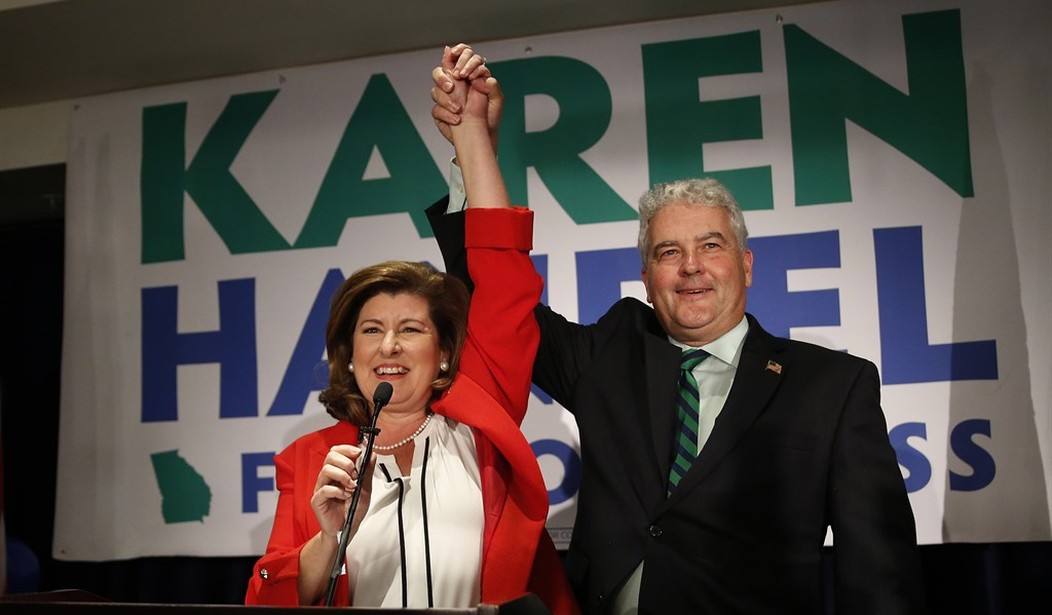Say, wasn’t Ossoff supposed to win this race sort of handily? Two different polls taken over the past month had him leading by seven(!) points. Between May 10th and June 15th, he led in every poll tracked by RCP except one — and that one was tied. The polls blew it again!
Well … not exactly. Per Sean Trende, note the trend below over the race’s final days, as Handel finally achieved liftoff:

On June 12th Ossoff led comfortably, 49.8 to 45. One week later it was Handel 49.0 to Ossoff’s 48.8. She was actually a verrrrry slight favorite by the time polls opened yesterday morning. She ended up winning by nearly four points, not 0.2, but combine the margin of error with the really obvious late break towards the Republican candidate and there’s nothing all that surprising about last night’s result. Data nerds are laughing at journalists on social media today, in fact, for seeming perplexed that a toss-up race in a red district might have ended up tilting towards the GOP nominee by a number in line with the average poll’s MOE.
Like, you looked at this chart and thought "there's no way Handel wins" -and I should trust you to report a school board meeting accurately? pic.twitter.com/xiEVcnrCct
— Micah Cohen (@micahcohen) June 21, 2017
Three notes about the final numbers. For the second time in eight months, the little-known Republican pollster Trafalgar Group almost nailed a tight race in which the conventional wisdom was pointing the other way. You may remember Trafalgar from the closing days of the presidential election in November, when they boldly predicted narrow Trump victories in Michigan and Pennsylvania — unthinkable upsets at the time. Their final poll of this race had Handel winning by two, making them the only pollster to have her on top since early May. They’re building quite a reputation for final-week surveys with eerily accurate results.
Was the late break towards Handel a straightforward matter of late-deciders in a Republican district coming home to the party or was there something more to it? Last night I kept thinking of what a local GOP chairman told WaPo a few days ago: “I think the [Scalise] shooting is going to win this election for us.” At least one outside group ran an ad (denounced by both Ossoff and Handel) framing the race as a referendum on whether the left’s worst elements would be rewarded after the assassination attempt in Virginia with an Ossoff victory. Handel’s numbers in the chart above began climbing before the shooting, with her average jumping 0.8 points between June 12th and June 13th, but they really took off after the violence on the 14th. She gained nearly three points over the final week of the race. Outraged at the attempted murder of Scalise, Republicans in the Sixth District may have turned out in higher numbers than expected to send a message to Democrats.
Last point, via Nate Silver: Did Democrats place too many of their eggs in this basket?
By the way, Democrats were dumb not to put more resources into South Carolina 5, which elected a Dem to the House as recently as 2008.
— Nate Silver (@NateSilver538) June 21, 2017
Hindsight is 20/20 and South Carolina’s Fifth District is ruby red, making it a much smaller target — in theory — for Dems than the Georgia special election was. Shockingly, though, the South Carolina outcome ended up tighter than the Handel/Ossoff race did. Republican Ralph Norman won by a mere 3.2 points over Democrat Archie Parnell in a district that’s 19 points more Republican demographically than America as a whole. The counterpoint to Silver is that Parnell made it as close as it was only because Democrats didn’t aggressively compete there: Local Republican voters may have assumed Norman would win and stayed home while Democrats turned out en masse, producing a surprisingly narrow Republican victory. If Democrats had gone all-in to promote the race, those lazy GOP voters would have behaved differently. Even so, $23 million was a lot of cheddar to sprinkle on a single House race in Georgia. How would Parnell have done if, say, 20 percent of Ossoff’s haul had been directed his way instead? Fortunately we’ll never know.









Join the conversation as a VIP Member